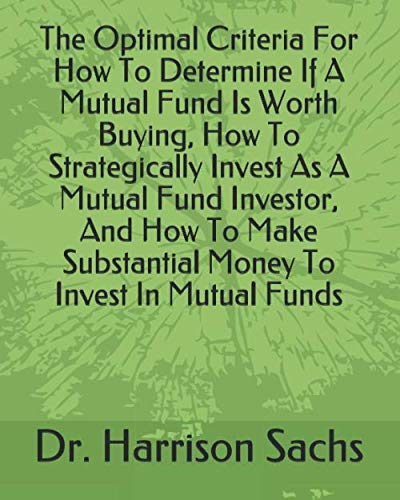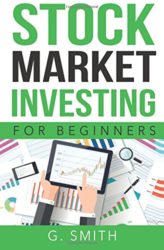The Optimal Criteria For How To Determine If A Mutual Fund Is Worth Buying, How To Strategically Invest As A Mutual Fund Investor, And How To Make Substantial Money To Invest In Mutual Funds

Independently publishedClick Buy Now for Updated Price. Estimated Price: $14.99 Free Shipping
This essay sheds light on the utmost optimal criterion for how to determine if a mutual fund is worth buying and elucidates how to strategically invest as a mutual fund investor. Moreover, how to make substantial money so that you can afford to invest in the mutual fund market is delineated in this essay. Even though the criterion to determine if a mutual fund warrants purchasing is often eminently complex, it ultimately does not have to be and can be streamlined so that is parred down into asking some six basic questions. While strategic investor may be inclined to turn to reading financial statements, ascertain dividend percentage yields, compute financial ratios, such as the price to earnings ratio and the price to earnings growth ratio, there is far more that should be taken into account before making a purchasing decision of an income generating asset, such as an equity or mutual fund share. The six basic questions that an investor should ask before purchasing a mutual fund in order to determine if it merits owning encompass the following: 1. Does the mutual fund pay a dividend? 2. Do at least 95% the companies the mutual fund tracks consistently report positive net income? 3. Are the majority of the companies the mutual fund tracks competing in a market with high barriers to entry and/or minimal competition? 4. Are a preponderance of the companies the mutual fund tracks dominate the market as one of the leading competitors? 5. Do the majority of the companies the mutual fund tracks have a significantly lower stock price than similar market a competitor? 6. Are the majority of the companies the mutual fund tracks able to maintain profitability in the coming years if it does not innovate? If you can answer yes to all six of these aforementioned criterion questions then it is highly likely that the mutual fund is eminently undervalued. If you answered yes to five out of six of the criterion questions it is still likely that the mutual fund is undervalued. However, if you answered yes to at most four out of six of the questions then the mutual fund is far more likely to be overvalued and therefore would not warrant a purchase for the more conservative investor. As per the first criterion question, it is critical for mutual funds to offer a dividend to their investors. The dividend not only renders the mutual fund an income generating asset, but also vindicates to investors that the investment management company has confidence in their investment shrewdness to warrant doling out dividend payments. In other words, it not only renders the mutual fund more valuable as an income generating asset that is not procured based purely off speculation for the prospect of earning a capital gain, but also allows investment management firms to win over the trust of investors and raise more investment money. In other words, the merits of the mutual fund are dubious if the investment management company does not have the confidence to offer a dividend to their mutual fund investors. Some investors completely abstain from ever buy non-dividend paying assets. As per the second criterion question, it is important for the majority of the companies the mutual fund tracks to consistently report earning positive net income annually. Companies should be able to efficaciously manage their resources and streamline and refine their business model to remain profitable in the digital era. When companies report earning negative net income, it is a clear tell-tale sign of under-performance and underlying financial issues. In the digital era, it can be a hardship to recover from insolvency, operational inefficiencies, mismanagement of resources, and the continual usage of an unprofitable business model. It is incumbent that companies are managed effectively and are not encumbered by debt and lack of positive cash flow. The majority of the companies the mutual fund tracks should not be unprofitable and lagging behind their competitors.

Click Buy Now for Updated Price. Estimated Price: 14.99
Originally posted 2020-02-26 18:23:40. Republished by Blog Post Promoter










